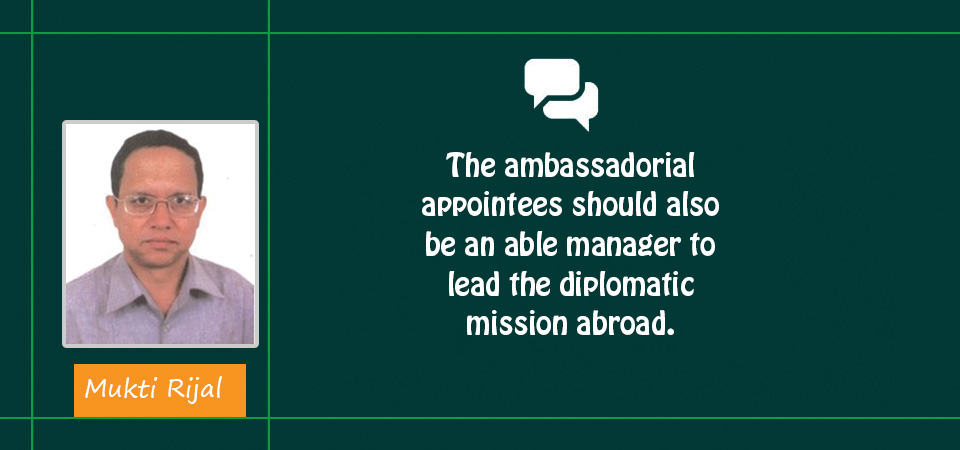Scrutiny In Diplomatic Appointments

Mukti Rijal
The government has named the ambassadors to 20 different countries at one go, the other day, beating all the past records. A big tally of 12 ambassadors has been subscribed from the political quota whereas eight come from the career bureaucracy representing the Ministry of Foreign Affairs.
The big contingent of the ambassadorial nominees who will be fanned out to different friendly nations in the near future have a seminal role to explain to the outside world Nepal's position, promote national interests and thus fully represent the country. The competence and experience of some of them as commented in the media may not support them to shoulder the sensitive and critical job that demands qualification, skills and expertise. Not only the corps of ambassadors named by the incumbent coalition government but the ambassadorial appointments executed by the previous governments have been always debated and subjected to harsh scrutiny.
Debate
Selection of ambassadors has not been free from controversies in the mature democracies like the UK, the USA and India, too. A Washington Post report published not very long back writes about the ambassador appointment process in the US: "Over the past few decades, about 30 per cent of all ambassadors have been “political” nominees. The other 70 per cent were career diplomats who worked their way up through the Foreign Service.
Although many political appointees may be chosen because of their suitability for the job, there is also a questionable but longstanding tradition of awarding ambassadorships to campaign donors or bundlers, Former President Richard M. Nixon, says the same Washington post report, can be heard telling his White House chief of staff, in a 1971 recording released decades later as part of the Nixon Tapes, that “anybody who wants to be an ambassador must at least give $250,000.
The incumbent US President Joe Biden had promised to appoint best people possible, not the campaign financiers, for the post of ambassadors. But he is alleged not to have been keeping his word. According to a news report, despite that campaign pledge, 25 of Biden’s ambassador picks are former “bundlers” (campaign financiers) constituting a third of the total, as per a Washington Post analysis.
He named Jane Hartley, a businesswoman and Democratic Party fundraiser as the US ambassador to Britain, continuing a practice in recent decades of appointing wealthy donors to the prestigious job. Hartley, who served as ambassador to Paris in the Obama administration, is a business executive, and is married to an investment banker, with a record of large-scale fundraising for Democratic candidates in the UK, potential ambassadors, the vast majority of them career diplomats, are recommended by the Foreign Office and have to be approved by the Buckingham Palace, as they have a dual role of representing the government and the Crown. In India too, ambassadorial appointments are not free from disputes and controversies.
Almost two decades now, there is an unwritten rule worked out between the Prime Minister's Office (PMO) and the Ministry of External Affairs (MEA) that the number of political appointees as ambassadors should be around six, the rest would be taken from the MEA bureaucracy. But now the rule has been reportedly breached and the PMO has the upper hand in selection and appointment of the ambassadors.
Coming to the context of Nepal, it is interesting to mention the fact that ambassadorial appointments began in 1934 with the appointment of Nepal's first envoy, Bahadur Shumsher Rana, to the UK. Rana was the younger brother of the then ruling Rana Prime Minister Judhha Shumsher and he had helped in the management of the country's affairs of the governance before he was appointed as an envoy to the UK. Ambassadorial candidates in Nepal are seconded from two sources, namely career Foreign Service cadres and political appointees.
Required qualities
Whether an envoy comes from the foreign ministry bureaucracy or outside may not be a major issue. The thing is that the nominee must be in possession of required qualities expected from a diplomat like having adequate knowledge of foreign affairs and diplomacy, effective communication and negotiation skills and capability to interact with bilateral and multilateral counterparts on the agenda with diplomatic dexterity and finesse.
The ambassadorial appointees should also be an able manager to lead the diplomatic mission abroad. They should possess a clear understanding of the political, social, cultural way of life of the people of the host country. Most importantly, they should be capable of enhancing national interest through interaction with the peoples of various walks of life especially civil societies, media, academicians and business communities. If the ambassadors are named and deployed to serve the vested political interests, their poor performance in the host country will not only ruin the image of the country but fail the nation on every diplomatic front.
(The author is presently associated with Policy Research Institute as a senior research fellow. rijalmukti@gmail.com)
Recent News

Do not make expressions casting dout on election: EC
14 Apr, 2022
CM Bhatta says may New Year 2079 BS inspire positive thinking
14 Apr, 2022
Three new cases, 44 recoveries in 24 hours
14 Apr, 2022
689 climbers of 84 teams so far acquire permits for climbing various peaks this spring season
14 Apr, 2022
How the rising cost of living crisis is impacting Nepal
14 Apr, 2022
US military confirms an interstellar meteor collided with Earth
14 Apr, 2022
Valneva Covid vaccine approved for use in UK
14 Apr, 2022
Chair Prachanda highlights need of unity among Maoist, Communist forces
14 Apr, 2022
Ranbir Kapoor and Alia Bhatt: Bollywood toasts star couple on wedding
14 Apr, 2022
President Bhandari confers decorations (Photo Feature)
14 Apr, 2022











